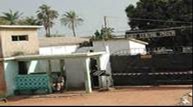By Yankuba Jallow
Momodou Lamin Jarju (alias Rongo) and his brother Lamin Jarju, have instituted an appeal before the Gambia Court of Appeal against the decision of the Banjul High Court.
When the case was called at the Gambia Court of Appeal on Tuesday 6th March 2018, before the panel presided over by the President of the Gambia Court of Appeal Justice Awa Bah, the appellants were present whilst the Respondent as well as his lawyer were absent. Lawyer Antouman A.B. Gaye and co appeared for the Appellants whilst Lawyer Kebba Sanyang, the Lawyer for the Respondent, was absent.
In this appeal case, Lamin Jarju is the first appellant, Momodou Lamin Jarju second appellant, the Minister of Local Government and Lands, the third Appellant and the Attorney General as the fourth appellant.
According to the first ground of appeal, the Appellants appealed that the learned trial Judge erred in law when he entered judgement in favour of the Respondent and declared them to be the owners of the suit land situated in Banjulinding Village in the West Coast Region, without the Respondent proving his case. According to the particulars, the Respondent did not give sufficient evidence to warrant the court to declare them to be the owners of the suit land; the Respondent’s case relied heavily on the weakness of the 1st and 2nd appellants’ case rather than on the strengths of their own case; that there was no evidence from the Respondent and his witnesses to prove that the suit land was a reserve land; that the Respondent’s purported ownership of the suit land woefully failed to meet the ownership criteria enunciated in the Supreme Court decision of Fatou Badjie and 4 others v Joseph Bassen 2002-2008 GLR.
On the second ground of Appeal, it is indicated that the Learned Trial Judge erred in law when he held that the Respondent had locus standi to bring this suit at the High Court against the 1st and 2nd Appellants, by an implied authority to institute the said suit. On the particulars of error, the appellants appealed that there was no evidence whatsoever from the Respondent in the lower Court that he obtained the consent and authority from the villagers of Banjulinding to institute the suit against the Appellants. Also, the Learned Trial Judge wrongfully conferred an implied authority upon the Respondent to bring the suit to the High Court, contrary to the pleading, testimony and the relevant law.
On the third ground of Appeal, the Learned Trial Judge erred in law when he held that the 1st and 2nd appellants were trespassers onto the suit land despite being in possession of the same suit land. On the particulars of error, it is indicated that the Respondent woefully failed to produce a better title deed if any, to that of the 1st and 2nd appellants title deeds over the suit land; that there was no evidence from the Respondent to show that the community of Banjulinding were in actual possession of the suit land and that the Respondent failed to show that the community had an exclusive possession of the suit land.


















